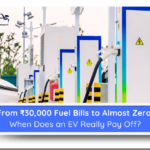
Delhi’s e-rickshaw boom grows, fueled by illegal charging points amid policy and safety gaps.
As of late 2023, Delhi registered the highest EV penetration among Indian cities, with 11.5% of all new vehicles sold being electric. At the heart of this achievement is a lesser-known reality: more than half of these EVs are three-wheeled e-rickshaws, crucial for last-mile connectivity and daily commutes, especially for lower-income groups.
Yet, as India EV has found, these vital contributors to clean mobility remain marginalized in the broader EV policy landscape. While subsidies and infrastructure have been largely geared toward private electric cars and two-wheelers, the very segment driving the numbers — the e-rickshaw fleet — has been left to fend for itself.
The Rise of the Informal Charging Economy
With nearly 1 million e-rickshaws operating in and around Delhi (though only 115,000 are officially registered), the city’s charging infrastructure has failed to scale in tandem. Approximately 40% of these vehicles are charged using unauthorized electricity connections, resulting in an annual loss of over ₹120 crore due to power theft, according to power distribution officials.
Our investigations reveal that illegal charging hubs have become commonplace — tucked away in urban slums, informal settlements, and warehouse alleys. These sites are not only unsanctioned but also dangerous. Live wires dangle precariously, e-rickshaws are charged over water puddles, and most of these setups operate without any safety compliance.
In contrast, public EV charging stations — often equipped for four-wheelers — sit underutilized just a few hundred meters away. “If public stations had sockets for us, we would absolutely use them,” says Mahinder Kumar Vishwakarma, a 52-year-old e-rickshaw driver. “But they’re not built for our vehicles.”
Why E-Rickshaw Drivers Are Falling Through the Cracks
The Delhi EV policy (2020) offers incentives like a ₹30,000 purchase subsidy and 5% interest subsidy on loans for e-rickshaws. However, most drivers remain unaware or unable to access these benefits due to bureaucratic hurdles, lack of information, or the informal nature of their vehicle ownership.
Rajesh, a driver originally from Bihar, shared with India EV that despite visiting multiple government and dealer offices for four years, he never received his subsidy. “They’d say the scheme isn’t active, or the company shut down. It was a dead end every time.”
Compounding the problem is the mandate for lithium-ion batteries, unaffordable for many drivers. As a result, many opt for cheaper, recycled lead-acid batteries, which are hazardous and officially banned — creating a cycle of non-compliance that further distances them from support schemes.
Safety and Tragedies in the Shadows
The consequences of this neglected ecosystem are tragic. In two separate incidents last year, a seven-year-old child and an e-rickshaw driver lost their lives due to electrocution from unsafe charging setups. Such incidents, especially during monsoons, are increasingly frequent, with fire and shock hazards becoming a grim reality of Delhi’s EV transition.
According to the Centre for Science and Environment, basic training and awareness can drastically reduce such incidents. Moreover, home charging — if done safely — remains more cost-effective and battery-friendly than commercial stations.
What Needs to Change: India EV’s Perspective
The ongoing exclusion of e-rickshaw drivers from mainstream EV infrastructure points to a policy design gap. Despite their significant role, these operators lack access to:
- Compatible public charging points
- Affordable, safe battery options
- Clarity in registration and subsidy processes
- Financial literacy and support to navigate schemes
In 2022 alone, over 1,000 unregistered e-rickshaws were impounded, with a scrapping deadline of just seven days — a move experts say is counterproductive to the broader EV mission.
With Delhi’s new EV policy in the pipeline, promising to make all new vehicles electric by 2027 and set up 13,200 charging stations, India EV urges policymakers to design a more inclusive roadmap — one that acknowledges the real engine of this revolution: the humble e-rickshaw driver.Without urgent corrective action, Delhi risks building a two-tier EV ecosystem — clean on paper, but powered in reality by neglect, informality, and risk.










